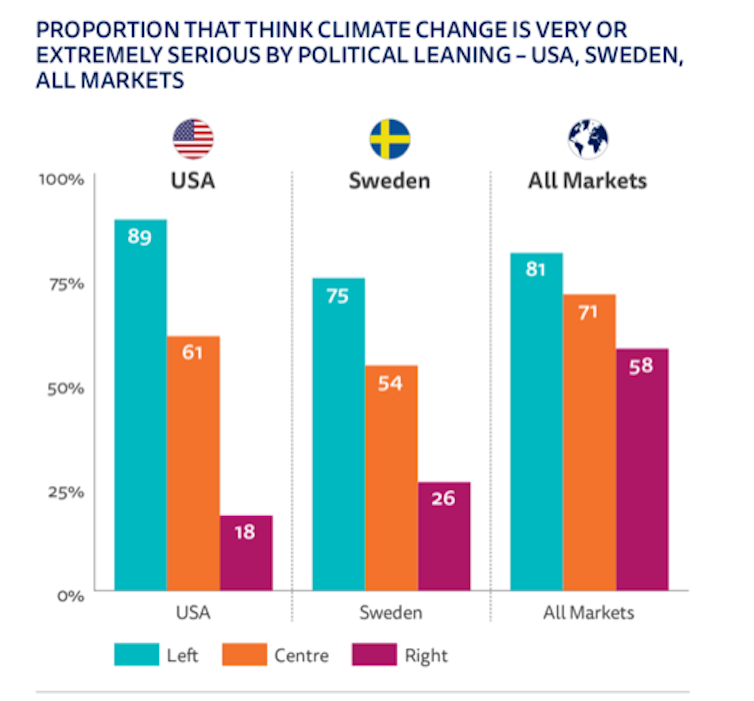How much do people around the world care about climate change? We surveyed 80,000 people in 40 countries to find out
This article is republished from The Conversation under a Creative Commons license. Read the original article.

ra2 studio / shutterstock
Simge Andı, University of Oxford and James Painter, University of Oxford
New survey results from 40 countries shows that climate change matters to most people. In the vast majority of countries, fewer than 3% said climate change was not serious at all.
We carried out this research as part of the University of Oxford’s Reuters Institute annual Digital News Reports. More than 80,000 people were surveyed online in January and February of this year.
Almost seven in ten think climate change is “a very, or extremely serious, problem”, but the results show notable country differences. Lack of concern is far higher in the US (12%) as well as in Sweden (9%), Greta Thunberg’s home country. Despite disastrous bush fires at the time of our fieldwork, 8% of respondents in Australia report that climate change is not serious at all. These groups with low levels of concern tend to be right wing and older.
Four of the five countries showing the highest levels of concern (85-90%) were from the global south, namely Chile, Kenya, South Africa and the Philippines. However, in countries with lower levels of internet penetration, our online survey samples over-represent people who are more affluent and educated.

Reuters Institute Digital News Report, Author provided
Perhaps surprisingly, the five countries with the lowest levels of concern are all in Western Europe. In Belgium, Denmark, Sweden, Norway and the Netherlands, only around half (or less) think that climate change is a serious problem.
It is the first time that results from survey questions on climate change have been included in the Reuters Institute’s reports, so it is difficult to draw out historical trends. However, results in 2015 from the Pew Center based on surveys in 40 countries (with different questions and countries to those in our survey) found that 54% of those surveyed thought that climate change was “a very serious” problem.
So it looks like concern for climate change may be rising globally. There is certainly strong evidence that it is increasing in some countries. In the US, in November 2019 two in three Americans (66%) said they were at least “somewhat worried” about global warming, an increase of 10 percentage points over the past five years.
In the UK, data from the CAST centre at Cardiff University showed that in 2019 levels of “worry” about climate change were at their highest recorded point. Extreme weather events, media reporting and wider publicity were mentioned by respondents as reasons for their increase in concern.
In our survey, across countries and markets, individuals who identify as left-wing tend to report higher levels of concern. This finding is even more visible in more polarised societies such as the US where 89% of those who self-identify on the left note that climate change is serious, compared to only 18% of those who self-identify on the right.

Reuters Institute Digital News Report, Author provided
We also find a similar divide in Sweden. As Sweden is widely considered one of the world’s most progressive nations, these results surprised us and we asked Martin Hultman, a researcher in climate denialism at Chalmers University in Gothenburg, what to make of them.
“These figures do not surprise me”, he told us in an email. “Since 2010, the leadership of the far-right political party Sweden Democrats has been against all types of policies to tackle climate change, including the Paris Agreement.”
“And we know that the spread of climate change denial ideas and rhetoric is widespread in Sweden – not least when digitally-born far-right media sites spread conspiracy theories about Greta Thunberg.”
TV news still dominates
Across all countries, people say they pay most attention to climate news on television (35%). Online news sites of major news organisations are the second most popular news source (15%), followed by specialised outlets covering climate issues (13%), then alternative sources such as social media and blogs (9%).
Figures from the UK, US and Australia are broadly in line with these preferences. Printed newspapers and radio are way down, with only around 5% saying each was the source they paid most attention to. In Chile, where the concern is high, specialised outlets covering climate issues (24%) as well as alternative sources such as social media (17%) are nearly as popular as television (26%).
The differences in climate news consumption are also visible among different age groups. Younger generations, more specifically the so-called Generation Z (aged 18-24), are more likely to report paying attention to alternative sources on climate change (17%) as well as TV (23%) and online news sites from major news organisations (16%). Older people, however, rely more heavily on TV (42%) and use less of the online news sites (12%) or alternative sources such as social media (5%).
Respondents from both sides of the political spectrum criticise the media for either being too doom-laden, or not bold enough, in their coverage of climate change. That said, our survey shows that almost half of our respondents (47%) think that news media generally do a good job of informing them about climate change, and 19% think that they do a bad job.
However, those who have low levels of concern are much more inclined to say that the news media are doing a bad job (46%). This might indicate a lack of trust in climate change coverage or a more general loss of confidence in the news media.![]()
Simge Andı, Postdoctoral Research Fellow, Reuters Institute for the Study of Journalism, University of Oxford and James Painter, Research Associate, Reuters Institute, University of Oxford
This article is republished from The Conversation under a Creative Commons license. Read the original article.
‘Devastating’: Right-Wing Swedish Government Shutters Environment Ministry
“It is impossible to describe more clearly how little this government values the environment and the climate,” said the leader of the Swedish Greens.

JAKE JOHNSONOctober 19, 2022
In one of its first moves after taking power Tuesday, Sweden’s newly elected right-wing government scrapped the country’s environment ministry, drawing outrage from opposition lawmakers who say the step threatens to undermine the nation’s chances of meeting its climate targets.
“They don’t care about our common future. Expect huge cuts in green funding.”
Per Bolund, the leader of the Swedish Greens, wrote on social media that the axing of the environment ministry shows “how little this government values the environment and the climate.”
“This is a historic decision with devastating consequences for environmental issues,” Bolund added, noting that Sweden will now be without a separate environment ministry for the first time in five decades.
Pär Holmgren, a Swedish meteorologist and member of the European Parliament, also expressed outrage on Twitter.
Following the change announced by right-wing Prime Minister Ulf Kristersson, new environment minister Romina Pourmokhtari will work under the minister for energy, business, and industry, Ebba Busch.
Busch is the leader of Sweden’s Christian Democrats, part of the right-wing coalition now governing the country after winning a slim majority in September’s elections. The bloc includes the Sweden Democrats, a far-right xenophobic party.
Bloomberg reported Tuesday that “Kristersson’s government is heavily dependent on the nationalist Sweden Democrats, the only party in parliament that doesn’t back the country’s target of having net zero emissions by 2045.”
“The four-party alliance that agreed on forming the new government last week said they would seek to lower fuel prices, partly by reducing the percentage of biofuels that has to be mixed into gas and diesel to the minimum level required by the European Union,” Bloomberg noted. “That would make it more difficult to reach a target of reducing transport emissions by 70% by 2030.”
Kristersson is also pushing for an expansion of nuclear power, aiming to reverse earlier efforts to dismantle the country’s reactors.
The Associated Press reported Tuesday that Kristersson said “Sweden’s goal on electricity production would change from ‘100% renewable’ to ‘100 percent fossil-free,’ which leaves room for nuclear energy.”
Republished from Common Dreams under Creative Commons (CC BY-NC-ND 3.0) licence.
Apologies for bad news Sunday, this blog doesn’t do denial of reality.